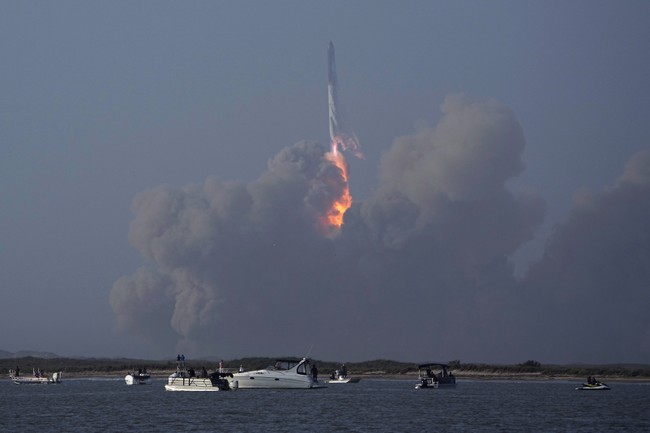
All I can say is AWESOME!
While not perfect, the third test flight of SpaceX’s Starship hit most of its major milestones and provided some of the most awesome images ever sent live from space, including high-definition video from the outside of the spacecraft during the initial phases of reentry.
You could see the plasma envelope develop around the heat shield at the beginning of reentry–something never seen before.
AWESOME!
SpaceX had a significant number of objectives to meet, and it succeeded in proving much of the design and engineering of the spacecraft.
The major milestones were to be:
- Successful launch of the booster and vehicle
- Safe separation of the booster from the vehicle
- Reentry of booster
- Landing in the sea using Raptor engines (no recovery of booster)
- Suborbital trajectory of Starship
- Test of payload doors
- Test of fuel transfer
- Successful relight of Space Raptor engines
- Controlled reentry
- Splashdown in Indian Ocean
The re-entry of the booster went well, but not all the required engines relit to ensure a controlled landing of the booster. The relight of the Raptor engines in space was not attempted, and the vehicle was lost sometime during reentry for, as yet, unknown reasons. All other mission objectives appear to have been met.
Those are pretty big objectives, suggesting that the Starship system is prepared to do most of its space missions, but is still not able to successfully meet the requirement of reuse. If you can’t land the spacecraft and booster you obviously can’t reuse them.
Not bad for the third test flight though! Few people thought that every objective would be met.
Starship is the largest spacecraft ever built, and its liftoff is correspondingly AWESOME!
Liftoff of Starship! pic.twitter.com/FaNcasuKaq
— SpaceX (@SpaceX) March 14, 2024
The so-called “hot staging” separation went perfectly, with the vehicle igniting its engines, initiating the separation between the vehicle and the booster without apparent damage to either.
Starship’s Raptor engines have ignited during hot-staging separation. Super Heavy is executing the flip maneuver pic.twitter.com/T593ACilyD
— SpaceX (@SpaceX) March 14, 2024
We were able to watch much of the booster’s reentry, and it made its way down to the point of engine relight above the ocean, but not all the required engines needed for a softer landing ignited, leading to a splashdown at terminal velocity. There was never any intent to recover the vehicle, but there was hope that it would make a controllable splashdown.
The actual Starship itself was healthy during the suborbital flight (although the failure to attempt the relight of the engines for a trajectory boost obviously needs explanation and repair), and the craft seems to have met all its objectives in space other than that.
The absolute highlight of the flight, though, was the video portion of the reentry itself. The view was from outside the spacecraft, using a camera mounted on one of the controllable canards.
Starship re-entering Earth’s atmosphere. Views through the plasma pic.twitter.com/HEQX4eEHWH
— SpaceX (@SpaceX) March 14, 2024
Watching the plasma heated by the reentry of the vehicle into the atmosphere: AWESOME!
It is far too early to know exactly what we can take away from this particular mission. There were a lot of moving parts, a lot of stretch goals, and potential subtleties that we can’t speculate on until SpaceX does a detailed report on what they learned from this particular test.
SpaceX has several vehicles already built, so it has the potential to conduct more tests quickly, although there are both regulatory hurdles to overcome (we won’t know what they are until the FAA and NTSB tell us what they are), and SpaceX will have to identify potential fixes and implement them.
As you know, Elon Musk and his companies have been subject to a harassment campaign by the Biden Administration, but their ability to put unnecessary hurdles in the way of Starship testing is NASA’s reliance on the craft for its own missions to the moon, and the Department of Defense’ partnerships with SpaceX.
As the world’s most important launch company–by a huge margin–it’s difficult to impossible for politics to interfere too much with its operations and technical development. In 2023 it launched at a pace inconceivable just a few years ago, launching a rocket at a pace just under one every 3 days. It has what amounts to a de facto monopoly on commercial launch, launching more rockets than everybody else combined by a huge margin. 80% of all payload going into space is carried on SpaceX rockets.
Starlink, too, is vitally important to the Defense Department in ways that we don’t even understand and promises to become even more important in the years to come. It provides redundancy that no DOD satellite could possibly match.
Bottom line: as with all Elon Musk projects it is taking longer than he promised, and will do far more than anybody actually believed possible when it comes to fruition.
In the meantime, expect incredible video footage, sure to ignite wonder and a renewed passion for spaceflight.










